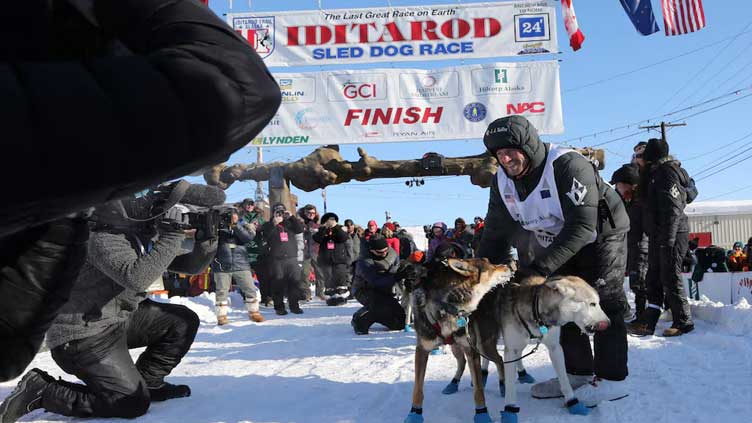Seavey overcomes moose encounter, wins Alaska's 52nd annual Iditarod

Sports
Seavey finished in nine days, two hours, 16 minutes and eight seconds
Alaska (Reuters) - Musher Dallas Seavey became the first six-time champion of the grueling Iditarod sled-dog race on Tuesday in the 52nd annual running of the event in Alaska, event officials said.
Seavey overcame not only the brutal Alaska elements, but just two days into the race was forced to shoot a moose that "became entangled" with his team of dogs on the trail.
"Dallas has proven his ability to overcome adversity on multiple occasions and this historic win is the embodiment of his professionalism, strength and full exemplary dog care," Rob Urbach, the chief executive of the Iditarod, said in a written statement.
Seavey finished in nine days, two hours, 16 minutes and eight seconds, the Iditarod's statement said. For his victory, Seavey will win the largest percentage of a $500,000 purse.
The rest of the field will continue the race until the last person crosses the finish line and wins the "red lantern" award for demonstrating perseverance.
The event opened with a ceremonial running through Anchorage, Alaska, on March 2 and ended on Tuesday in the Bering Sea town of Nome after mushers and their teams of dogs traveled 1,000 miles.
The Iditarod organization said on social media that Seavey crossed the finish line at 5:16 p.m. local time with 10 dogs.
On March 4, Iditarod officials said in a written statement that Seavey had been forced to shoot a moose in self-defense "after the moose became entangled with the dogs and the musher on the trail."
Seavey was given a two-hour penalty for not sufficiently gutting the animal, as required by the race rules. The moose meat was salvaged and distributed to people to eat.
Seavey, who finished first in 2012 as the youngest Iditarod champion in its history, at age 25, went on to win four more races before his historic win this year.
He has also won the Yukon Quest sled dog race twice, and is the son of three-time Iditarod champion Mitch Seavey.
The number of competitors this year, 38, was one of the smallest fields going back to the first year of the race in 1973, when 34 signed up. Last year was the smallest roster, with just 33 entries. In its heyday, the race featured 70 to 80 entrants.
The race, commemorating a famed dog-sled relay to deliver diphtheria serum to Nome in 1925, has come a long way since it began as a low-budget novelty event consisting entirely of amateur mushers and taking 20 days to complete.
Now, top Iditarod contestants are professionals with high-tech gear bearing sponsors' logos. Teams are tracked by global positioning satellite, and live coverage is streamed worldwide to audiences via the internet.


